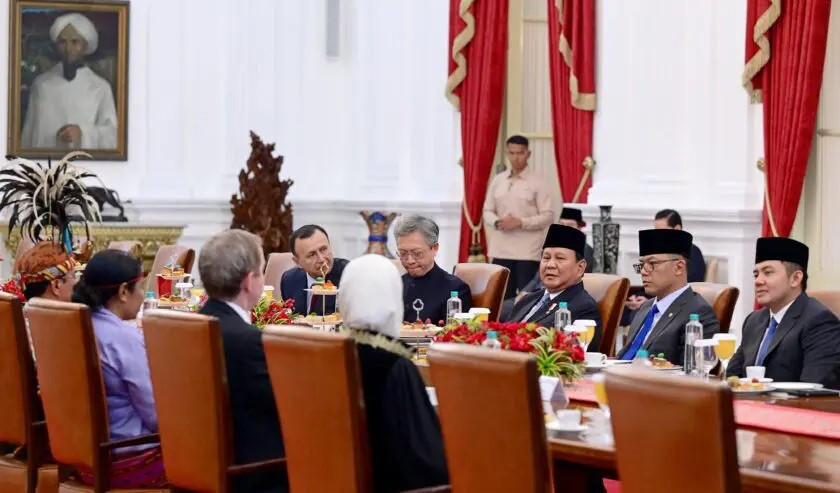Headline: Seven Ambassadors Strengthen Diplomatic Ties with Indonesia
Indonesia’s Diplomatic Landscape Shifts: A New Era of Collaboration
In a significant diplomatic event at Merdeka Palace on Monday, President Prabowo Subianto welcomed ambassadors from seven nations, marking a renewed commitment to strengthening bilateral ties with Indonesia. This gathering not only underscored Indonesia’s growing global significance but also highlighted the key sectors for future collaboration. Engaging with countries ranging from the Netherlands to Zimbabwe, these ambassadors seek to enhance their partnerships in areas crucial for mutual growth, setting the stage for expansive economic and cultural exchanges.
Strengthening Indonesia-Netherlands Relations
Dutch Ambassador Marc Gerritsen, who described the relations between the Netherlands and Indonesia as "special," emphasized the importance of focusing on food, water management, sustainable energy, investment, and industrial downstreaming. These priorities resonate with President Prabowo’s vision for Indonesia’s development, particularly in enhancing its self-sufficiency and sustainability.
“The Netherlands is ready for deeper cooperation and hopes Indonesia will work closely with the Netherlands and the European Union,” Gerritsen remarked, demonstrating his commitment towards fostering a robust partnership. He concluded his statement with a traditional Javanese phrase, "matur nuwun," expressing deep gratitude and respect toward Indonesia.
Clean Energy and Agriculture Partnerships with Zimbabwe
Zimbabwean Ambassador Martin Makururu also expressed enthusiasm about the potential partnerships between Zimbabwe and Indonesia. Highlighting the prospects in clean energy and agriculture, he pointed out Zimbabwe’s significant lithium resources, which could support Indonesia’s burgeoning electric vehicle production sector.
“Zimbabwe has significant lithium resources, and we know Indonesia is a leader in electric vehicle production, so we seek robust cooperation in this area,” Makururu said. This collaboration could pave the way for innovative technologies and robust economic growth for both nations.
Commitment from Central Asian Nations
Ambassador Oybek Eshonov from Uzbekistan echoed similar sentiments, reaffirming his country’s dedication to fortifying bilateral ties with Indonesia. The collective interest from Central Asian diplomats indicates a potential for increased trade and cultural exchanges, which can enhance regional stability and foster inclusive development.
Adding to the dialogue, Chinese Ambassador Wang Lutong expressed pride in the historically close relations between Indonesia and China. “Indonesia is a large, culturally rich nation,” Lutong stated. “We are writing a new chapter in our bilateral relations, and I am honored to be part of it.” Such sentiments reflect a shared vision for collaborative growth and cultural connection in a rapidly evolving global context.
Expanding Diplomatic Ties: Algeria, Mongolia, and Timor Leste
In addition to the aforementioned ambassadors, President Prabowo also received letters of credence from ambassadors representing Algeria, Mongolia, and Timor Leste. Each of these partnerships opens
up new avenues for cooperation, particularly in trade, cultural exchange, and regional security, further enriching Indonesia’s diplomatic landscape.
The Broader Implications for Indonesia’s Foreign Relations
The concerted efforts by these ambassadors to deepen bilateral ties can be viewed as a pivotal moment in Indonesia’s foreign relations. As the nation continues to position itself as a regional leader, establishing strong partnerships with diverse countries is essential for enhancing economic resilience and fostering sustainable development.
- Enhanced Economic Growth: The focus on specific sectors—such as clean energy and sustainable agriculture—offers Indonesia new opportunities to innovate and lead in global markets.
- Cultural Exchange and Collaboration: These partnerships are not only about economic gain; they promote mutual understanding and respect, cultivating cultural ties among nations.
- Strategic Alliances: With countries like Zimbabwe expressing intent to collaborate in the electric vehicle sector, Indonesia could reinforce its leadership in renewable energy and technology.
Engaging with Global Perspectives
As Indonesia navigates this new diplomatic landscape, engaging with the voices of experts and stakeholders from these countries can foster greater understanding and collaborative measures. Leveraging cultural ties, historical relationships, and shared economic interests will be fundamental in shaping Indonesia’s future as a leader in Southeast Asia.
Involving the Community and Future Engagement
The recent ceremony at Merdeka Palace signifies much more than a routine diplomatic function; it represents an ongoing commitment to collaborative growth. As Indonesia cultivates these partnerships, the focus on mutual benefit and shared progress could redefine Indonesia’s role on the world stage, fostering a community that is resilient and prepared for the challenges of tomorrow.
We invite our readers to share their thoughts. What do you think about Indonesia’s growing international partnerships? How do you see these diplomatic relations impacting our community and economy in the near future? Join the conversation in the comments below!
For more insights on Indonesia’s diplomatic efforts and related news, visit our articles section.
Explore additional resources on international relations from reputable sources like the United Nations, or read about Indonesia’s economic strategies on World Bank for comprehensive analysis.

